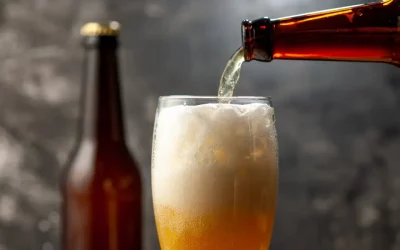Beer is an alcoholic beverage brewed from cereal grains which are responsible for its nutritional values. People usually prefer to drink it with certain meals and it is the third most popular drink preceded by tea and water.
Beer has a greater protein and vitamin B content than wine, while its antioxidant content is equivalent to that of wine. Hops, a major component for brewing this beverage, are rich sources of flavonoids, which are potent antioxidants.
It is a very good source of certain minerals that play essential roles in various metabolic processes. If taken in moderate quantities, it can definitely boost your health in a number of ways.
BEER BENEFIT 1: Prevents Cancer
Could beer prevent cancer? Scientists at the University of Idaho think so.
At the National Meeting of the American Chemical Society in January, researchers presented findings that suggested a key ingredient in beer could be used in the fight against cancer and inflammatory diseases.
A flavonoid compound called xanthohumol is found in the hops commonly used in brewing beer. It has been seen to play a major role in the chemoprevention of cancer, including prostate cancer. According to Bio-medicine, it is also a good source of polyphenols, due to the grains used for fermentation. It has been proven effective in fighting cancer, just like red wine.
Acids called humulones and lupulones, which are also found in hops, possess the ability to halt bacterial growth and disease, and scientists hope to find a way to extract these compounds or synthesise them in a lab in order to develop active agents for cancer-treating pharmaceuticals.
BEER BENEFIT 2: Beer lowers the risk of kidney stones
Last year, a study suggested that the risk of developing kidney stones decreases with increasing beer consumption.
Researchers of the National Public Health Institute at Helsinki used their detailed study of 27,000 middle-aged men to conclude that “each bottle of beer consumed per day was estimated to reduce risk by 40 per cent”.
The study authors noted that both the water and alcohol found in beer are shown to increase urine flow and dilute urine, thereby reducing the risk of stones forming. Alcohol may also increase the excretion of calcium, the prime constituent of kidney stones.
BEER BENEFIT 3: Beer protects you from heart attacks
Another research held found that dark ales and stouts can reduce the incidence of heart attacks.
Atherosclerosis – when artery walls become furred-up with cholesterol and other fatty substances – is known to cause heart problems, but a different study revealed that beer can cut the risk of this disease by as much as half.
However, the most important thing here was that moderation is the key.
Beer contains vitamin B6, which protects against heart diseases by preventing the build-up of a compound called homocysteine. It has a thinning effect on the blood and prevents the formation of clots, which cause blockages in the coronary arteries. Moderate consumption also reduces the risk of inflammation, the root cause of atherosclerosis, which is cholesterol and plaque building up on the blood vessels and artery walls.
BEER BENEFIT 4: Beer reduces the risk of strokes
Studies by both Harvard Medical School and the American Stroke Association have shown that people who drink moderate amounts of beer can cut their risk of strokes by up to a 50pc, compared to non-drinkers.
Ischaemic strokes are the most common type of stroke. They occur when a blood clot blocks the flow of blood and oxygen to the brain. However, when you drink beer, your arteries become flexible and blood flow improves significantly.
As a result, no blood clots form, and your risk of having a stroke drops exponentially.
BEER BENEFIT 5: Beer strengthens your bones
Beer is known to contain high levels of silicon, an element that promotes bone growth.
But you have to get the balance right. A very shocking research concluded that whilst one or two glasses of beer a day could significantly reduce your risk of fracturing bones, more than that would actually raise the risk of breakages.
So be careful when you visit the pub: if you drink too much, your bones will be weakened and those drunken nigh time tumbles could result in nasty fractures. Drink the right amount, however, and you’ll walk home with your bones and dignity in-tact.
BEER BENEFIT 6: Beer decreases the chance of diabetes
In 2011, Harvard researchers found that middle-aged men who drink one or two glasses of beer each day appear to reduce their risk of developing type 2 diabetes by up to 25pc.
A professor at the Harvard School of Public Health, studied 38,000 middle-aged men, and concluded that the alcohol content in beer increases insulin sensitivity, which helps prevent diabetes. Additionally, beer is a good source of soluble fibre – a dietary material that helps to control blood sugar and plays an important role in the diet of people suffering from diabetes.
So, whether you’ve got diabetes or not, a glass of beer is just what the doctor ordered.
Dutch researchers analysed 38,000 male health professionals and found that when men who weren’t big boozers began drinking moderately over 4 years, they were significantly less likely to be diagnosed with type 2 diabetes.
Increased alcohol consumption over time didn’t lower the risk in men who already had a couple drinks a day, so moderation is the key word here
BEER BENEFIT 7: Beer reduces the risk of Alzheimer’s
Studies dating back to 1977 have suggested that beer drinkers can be up to 23pc less likely to develop cognitive impairment, Alzheimer’s disease or other forms of dementia.
However, despite the statistics speaking for themselves – one study surveyed over 365,000 people – it is unknown why moderate drinking can have a beneficial effect. One theory suggests that the well-known cardiovascular benefits of moderate alcohol consumption, such as raising good cholesterol, also can improve blood flow in the brain and thus brain metabolism.
The silicon content of beer could also be responsible. Silicon is thought to protect the brain from the harmful effects of aluminum in the body – one of the possible causes of Alzheimer’s.
BEER BENEFIT 8: Beer can cure insomnia
Beer is a natural nightcap. Ales, stouts and lagers have been found to stimulate the production of dopamine, a compound that may be prescribed to insomnia sufferers by a doctor, in the brain.
According to research, simply tasting beer increases the amount of dopamine in the brain – and thus make drinkers feel calmer and more relaxed. However, the academics clarified that these effects are achieved after only a taste, and so a paltry 15 millilitre serving is all you need – the equivalent of one tablespoon of beer.
BEER BENEFIT 9: Beer can stop cataracts
Too much and your vision will get blurry, but consume just the right amount of beer and your eyes will benefit.
Researchers at the University of Western Ontario found that the antioxidants found in beer, particularly ales and stouts, protected against mitochondrial damage.
Cataracts are formed when the mitochondria – parts of a cell responsible for converting glucose into the energy – of the eye’s outer lens are damaged. Antioxidants protect the mitochondria against this damage, and therefore the study authors recommend one drink a day to keep the eye doctor away.
BEER BENEFIT 11: Beer helps you lose weight
It may seem a strange one, considering we’ve named the ‘beer belly’ after the weighty effects of alcohol, but researchers seem to think that beer can help you shed some pounds.
Scientists published a study earlier this year showing that a compound called xanthohumol, commonly found in hops, can lower an individual’s chances of developing metabolic syndrome – a condition that indicates obesity, elevated blood pressure, increased blood sugar, and bad high-density lipoprotein (HDL) cholesterol levels.
Sadly, the researchers concluded that humans would have to drink over 3,500 pints of beer a day to feel the benefits of the ‘miracle’ compound – by which point they’d need a miracle just to be alive.
BEER BENEFIT 12: Think Like A Genius
Knocking back a beer or two won’t make you smarter, but it could boost your creativity, according to a study in the journal Consciousness and Cognition.
When 40 men watched a movie while completing verbal puzzles, beer-buzzed guys with a blood alcohol content of .075 solved the problems a few seconds faster than their sober counterparts.
Official guidance says that it is safest to drink less than 14 units a week. If you do regularly exceed this, it’s best to spread your drinking over three or more days.

 Summarize this Article with AI
Summarize this Article with AI






